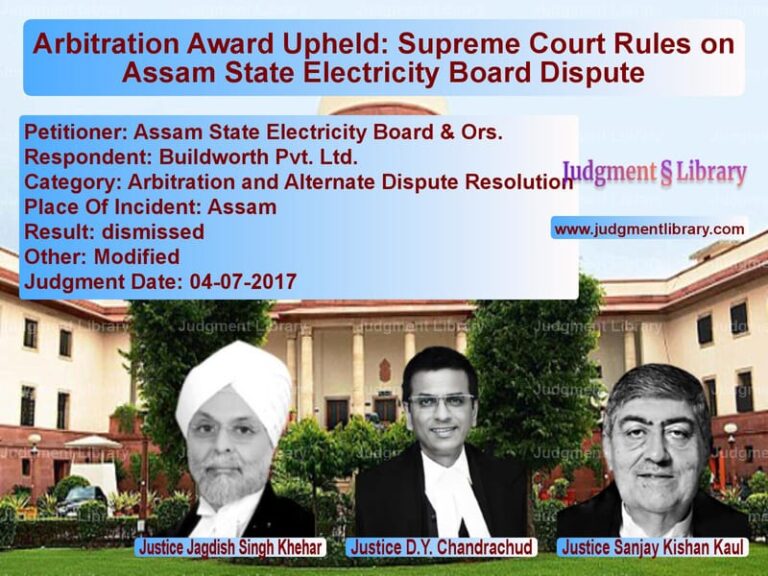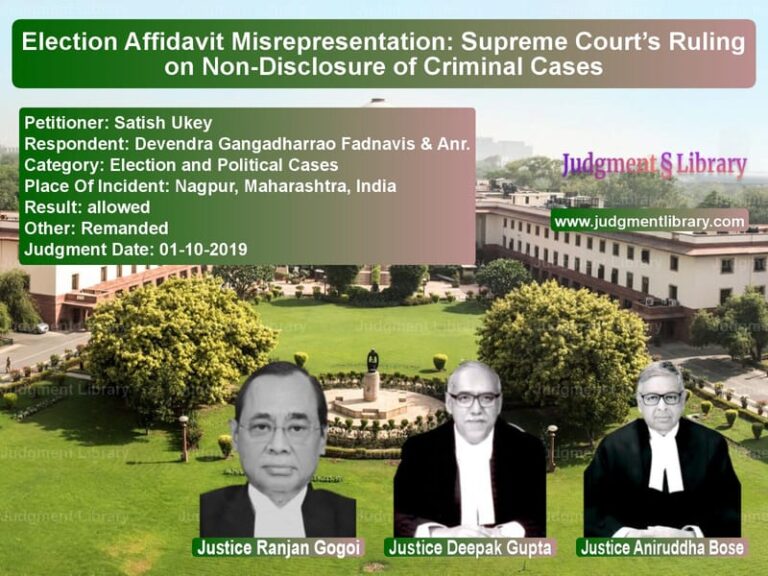Supreme Court Upholds Property Rights: Landmark Judgment on Sale Deed Validity
Land ownership disputes have long been a complex issue in India, often leading to prolonged legal battles. The recent Supreme Court judgment in the case of Kaushik Premkumar Mishra & Anr. vs. Kanji Ravaria & Anr. serves as a crucial precedent in reinforcing the sanctity of property transactions and preventing fraudulent claims over previously sold land. The case highlights how fraudulent transactions and legal loopholes can be misused to dispossess rightful owners and how the legal system protects their rights.
Background of the Case
The dispute centered around a piece of land located in Shelwali, Tehsil Palghar, District Thane, Maharashtra. The appellants, Kaushik Premkumar Mishra and his minor brother, purchased the land via a sale deed dated December 2, 1985. Due to a deficiency in stamp duty, the document could not be registered immediately and was eventually registered only on June 14, 2011. However, in the interim, the original seller (respondent no.2) fraudulently sold the same land to respondent no.1 in 2010, leading to legal proceedings.
Legal Issues and Court Proceedings
The case raised several important legal questions, including:
- Does delayed registration affect the validity of a sale deed?
- Can a seller, after executing a sale deed, retain any right to the property?
- Is a subsequent buyer protected under the doctrine of a bona fide purchaser?
- How does the law treat property transactions involving minors?
The case was initially brought before the Trial Court, followed by appeals in the Bombay High Court, and finally reached the Supreme Court.
Findings of the Trial Court
The Trial Court ruled in favor of the respondents, holding:
- The 1985 sale deed was void since the vendees (purchasers) were minors at the time.
- Under Section 11 of the Indian Contract Act, 1872, minors cannot enter into a contract.
- Since registration was delayed for 26 years, the sale deed was unenforceable.
Bombay High Court’s Judgment
The Bombay High Court upheld the Trial Court’s decision, ruling that:
- The sale deed in 2010 was valid and took precedence over the 1985 deed.
- The 1985 sale deed, due to its delayed registration, could not be relied upon.
- The subsequent buyer (respondent no.1) was protected as a bona fide purchaser.
Supreme Court’s Analysis and Judgment
The case was ultimately taken to the Supreme Court, where a detailed examination of the facts and legal principles was conducted. The Supreme Court set aside the High Court’s ruling and upheld the rights of the original purchasers (appellants).
1. Validity of the 1985 Sale Deed
- The Supreme Court ruled that a sale deed takes effect from the date of execution, not the date of registration.
- Since the deed was validly executed in 1985, its registration in 2011 did not diminish its legal standing.
- The delay in registration was due to a stamp duty deficiency and did not affect ownership.
2. Rights of Minors in Property Transactions
- The Court observed that minors can hold property but cannot enter into contracts.
- In this case, the minor was represented by his legal guardian (mother), making the transaction legally sound.
- Since no party challenged the sale deed’s execution at the time, it remained valid.
3. Fraudulent Conduct by the Seller
- The original seller (respondent no.2) had no authority to execute a second sale in 2010.
- Once the land was sold in 1985, the seller lost all rights to it.
- The second sale was fraudulent and amounted to a misrepresentation of ownership.
4. Rights of a Bona Fide Purchaser
- The respondent no.1 (subsequent buyer) claimed to be a bona fide purchaser.
- The Supreme Court rejected this argument, citing that the buyer failed to conduct proper due diligence.
- The “as-is” clause in the 2010 sale deed suggested that the buyer was aware of potential disputes.
Supreme Court’s Final Judgment
The Supreme Court ruled:
- The 1985 sale deed was legally valid and binding.
- The 2010 sale deed was fraudulent and was declared null and void.
- Respondent no.1 was not entitled to claim ownership.
- Exemplary costs of Rs.10 lakh were imposed on the respondents for their fraudulent actions.
Legal Precedents Cited
The Supreme Court relied on several precedents to support its ruling:
- Alka Bose vs. Parmatma Devi (2009) – Confirmed that a signed agreement with possession delivered constitutes a valid contract.
- Suraj Lamps & Industries Pvt. Ltd. vs. State of Haryana (2009) – Reiterated the importance of due diligence in property transactions.
- Hardev Singh vs. Gurmail Singh (2007) – Affirmed that once a sale deed is executed, the seller loses all rights to the property.
Key Takeaways
The Supreme Court’s judgment in this case has significant implications for property law:
- Delayed Registration Does Not Invalidate a Sale: Once a sale deed is executed, its validity is not affected by a delay in registration.
- Minors Can Hold Property: Even if minors are involved in transactions, proper representation by a legal guardian ensures validity.
- Fraudulent Resale is Null and Void: Sellers cannot retain ownership after executing a valid sale deed.
- Bona Fide Purchaser Must Conduct Due Diligence: Buyers must verify property records before purchase.
Conclusion
This landmark case underscores the importance of protecting property rights and preventing fraudulent real estate transactions. The Supreme Court’s decision reinforces that once a property is legally sold, the seller loses all rights over it. This judgment sets a strong precedent for future cases involving property disputes and fraudulent sales, ensuring justice for rightful owners.
Petitioner Name: Kaushik Premkumar Mishra & Anr..Respondent Name: Kanji Ravaria @ Kanji & Anr..Judgment By: Justice Vikram Nath, Justice Ahsanuddin Amanullah.Place Of Incident: Shelwali, Tehsil Palghar, District Thane, Maharashtra.Judgment Date: 18-07-2024.
Don’t miss out on the full details! Download the complete judgment in PDF format below and gain valuable insights instantly!
Download Judgment: kaushik-premkumar-mi-vs-kanji-ravaria-@-kanj-supreme-court-of-india-judgment-dated-18-07-2024.pdf
Directly Download Judgment: Directly download this Judgment
See all petitions in Property Disputes
See all petitions in Landlord-Tenant Disputes
See all petitions in Contract Disputes
See all petitions in Judgment by Vikram Nath
See all petitions in Judgment by Ahsanuddin Amanullah
See all petitions in allowed
See all petitions in supreme court of India judgments July 2024
See all petitions in 2024 judgments
See all posts in Civil Cases Category
See all allowed petitions in Civil Cases Category
See all Dismissed petitions in Civil Cases Category
See all partially allowed petitions in Civil Cases Category







